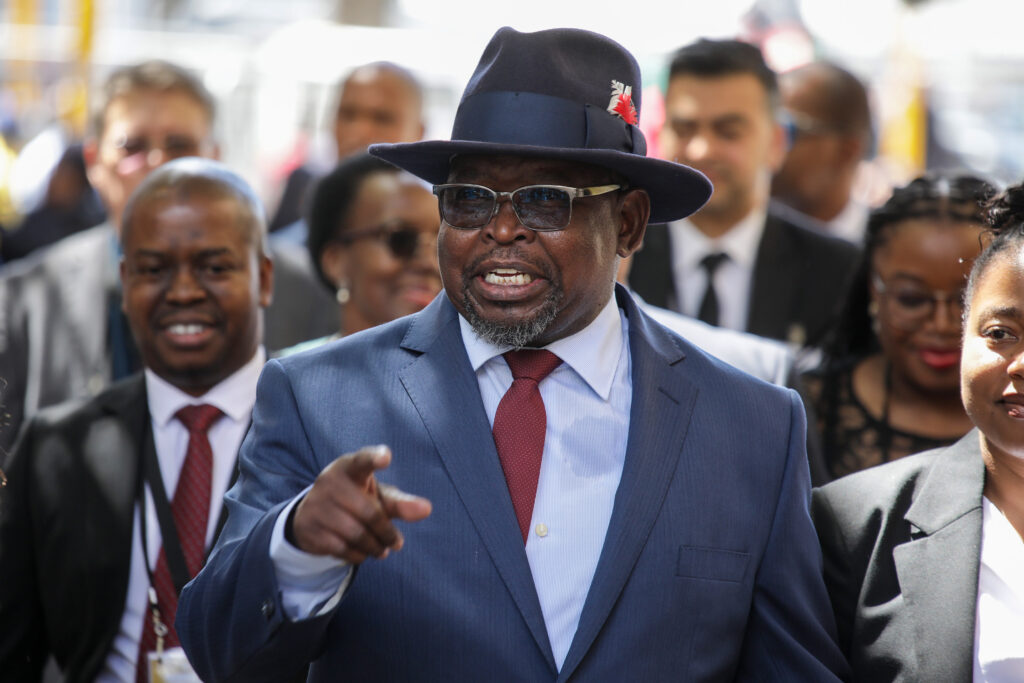You can also listen to this podcast on iono.fm here.
ADVERTISEMENT
CONTINUE READING BELOW
JEREMY MAGGS: Now it would seem that agriculture is under siege. What do I mean by that? Well, rising input costs, erratic weather, global trade headwinds. But at Nampo [National Maize Producers’ Organisation] 2025, in Bothaville, the farming sector is now pushing back with practical tools, bold ideas and also a renewed focus on resilience.
Standard Bank is at the heart of this year’s agenda. It’s been hosting a Pan-African dialogue and backing real-world innovation, it says, with financial muscle. I want to talk a little bit more about that with Brendan Jacobs, head of AgriBusiness at Standard, to tell us if agriculture is adapting fast enough or is it being left in the dust.
So, Brendan, the theme at Nampo this year is global agriculture locally. What do you think the biggest mismatch is at the moment between global innovation and the reality of farming in South Africa?
BRENDAN JACOBS: Ja, I think the theme firstly is so apt with everything going on in the macro environment currently, trade tariff-wise and just the spectre out there that we’re experiencing. It’s very important for us as the agri community to remain focused on being productive and efficient in what we’re doing locally before we start looking outside.
So I think maybe the mismatch, if I can answer your question this way, because I think there’s a lot of high-level information bordering on misinformation sometimes that distracts our farmers sometimes from focusing on those elements that are in their control…
Read/listen:
Jeremy’s weekly wrap: Tourism, nursing, agriculture — SA sectors at crossroads
Land Bank in talks to raise as much as $1bn
Nampo 2025: Trends, expectations, and standouts
JEREMY MAGGS: So let’s talk about those controllables then. You also suggest that farmers want practical tools these days, in theory, and I fully understand that. But what does the modern farmer need right now in that respect?
BRENDAN JACOBS: I think a lot of the basics will always remain, and that is seated really in good planning and organisation and ensuring your structure is in place properly.
So financial planning and planning in our instance, for example, with the bank or with your insurers, those are critical.
Then of course, to make sure that we, you mentioned climate at the top end of the chat, to make sure that you’ve got the best climate-smart cultivars, as an example, to stave off drought conditions. So I think the big thing for them to focus on is to make sure that they’ve got the most efficient and most technologically advanced systems in place to ensure their operations run optimally.
That’s the great thing about Nampo, the latest technology and the best practices are being shared through dialogue here. That’s why it’s so important for farmers to attend events like this.
JEREMY MAGGS: I’m glad you mentioned technology. We hear a lot these days, Brendan, about agritech, but do you think it’s really reaching smaller farmers or smallholders, or is it just a buzzword that benefits well-capitalised commercial farms?
BRENDAN JACOBS: Ja, I think the reality of tech, and especially in the developing environment or emerging farms, is we’ve got a long way to go, to be honest, Jeremy. I think it is so that there’s a lot of development and benefits in the commercial space. But we’ve got a long way to go insofar as it is the emerging farmers and exposing them to not only what it is that is available, but then also, of course, for them to have the means to implement and integrate that into their businesses.
We had, coincidentally, yesterday, we have an agribusiness transformation programme that we run, which we developed with the University of the Free State and the Department of Agriculture in the Free State, 30 to 35 black up-and-coming farmers, and one of the key aspects that is incorporated in the programmes is what are the things relevant and available to them in their specific fields, because it obviously differs depending on the type of operation they run, and how to integrate that. So we’ve got a long way to go in the industry, Jeremy, in that regard, to be honest.
JEREMY MAGGS: Brendan, let me ask you about one dark cloud that is maybe on the agri horizon, and that’s the Africa Growth and Opportunity Act [Agoa]. I’m wondering, given all the discussions that you’ve had in Bothaville, whether farmers and financiers are prepared now for a future where South Africa is inevitably going to be shut out of key US markets.
BRENDAN JACOBS: Ja, of course, the trade discussion is very pertinent. I think, as you would well know, it’s a bit of a moving target, to be honest, at the moment, announcements made and then changed thereafter. I think the important part, and one has to acknowledge what level of export goes to the States out of the agri space specifically, I think a fact that is not well known amongst the South African population is that 44% of South African agri exports actually go into Africa, with only around 6% or 7% going to America.
But it is so that about 72% of that is under Agoa, and, of course, we know that that’s limited mostly to citrus. There’s also some nuts and wine. The reality is, I think everyone’s speaking about finding alternative markets and readying themselves. But at the same time, it’s important, Jeremy, to remain calm.
ADVERTISEMENT:
CONTINUE READING BELOW
When you go and look in the detail of which subsectors, and then within that, which operations, have got direct exposure to America, it’s really a limited number of operations currently, and those guys I know are either through organised agriculture, busy with negotiations and/or looking at alternative markets.
At Standard Bank, having a strong footprint into Africa, but also into the Chinese corridor through our ICBC [Industrial and Commercial Bank of China] shareholding, we’re looking at markets such as that as potential options to engage with our clients for opportunities.
JEREMY MAGGS: So let me pick you up on that, referencing other opportunities. Your team’s hosting agribusiness leaders from a number of African countries. Are there deals or frameworks that are now starting to move the needle when it comes to cross-border agri trade?
BRENDAN JACOBS: I think it’s a fantastic opportunity, Jeremy. Maybe just for context, Standard Bank is operating in 20 countries in Africa, 15 of which we have dedicated agribusiness teams. So as I head up the operations in South Africa, my 14 colleagues from the other countries are all here with me at Nampo.
We actually had a breakfast with them and South African and some clients from the continent, and these dialogues are just unearthing such amazing opportunities. I was involved in some practical discussions, as recently as this morning, which were just mere introductions that are opening avenues to eliminating obstacles in some of their current operations. So I think it’s a fantastic opportunity and definitely something that we’re going to be focusing on with our clients.
JEREMY MAGGS: And just finally then, how difficult is it going to be to measure success in this space? Is it ultimately, particularly as far as Standard is concerned, just about credit books and profitability? Or is it about showing real transformational outcomes?
BRENDAN JACOBS: Jeremy, I think of course the numbers are important in delivering to shareholders. But in agribusiness, we feel that we’re serving a higher purpose of ensuring food security and reducing unemployment, and at the same time growing the economies in which we operate.
So I think that higher purpose of food security is so pertinent. I was at a chat earlier this week where it was referenced that it’s expected that the population of Africa would be doubling by 2050 and, of course, we know as a sector across the continent we need to deliver on that.
So whilst the numbers are important for us, the higher purpose of securing food security for South Africa and playing our little role in that value chain, with all the other role players in the agri value chain, that’s for me what success would really look like.
JEREMY MAGGS: Drive back safely from Bothaville. That is Brendan Jacobs, head of AgriBusiness at Standard Bank. Appreciate your time. Thank you.
Follow Moneyweb’s in-depth finance and business news on WhatsApp here.

 4 days ago
1
4 days ago
1






















 English (US) ·
English (US) ·